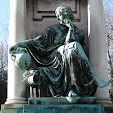 Carnations are, apparently, the birth flower for January, and so are seasonally appropriate. It's got a long history of being associated with love and fertility and fidelity - that seems to fit the fact of it coming in red and pink as well as white, though the fidelity aspect has become attached to it because of the fact that the color never fades. It was also thought of in the C19th as a peculiarly working class flower (and indeed, was taken up by socialists), and in 1907 was adopted as an official Mothers' Day bloom. I think I prefer its classical origins - Artemis, out hunting, threw a hissy fit when her quarry was frightened by a shepherd playing pan pipes, or a flute, or whatever was musically on offer in Arcadian groves - and tore out his eyes. Filled with remorse - as well she might be - she made carnations bloom where his eyes once were. So carnations, curiously, can well be linked to a lack of vision.
Carnations are, apparently, the birth flower for January, and so are seasonally appropriate. It's got a long history of being associated with love and fertility and fidelity - that seems to fit the fact of it coming in red and pink as well as white, though the fidelity aspect has become attached to it because of the fact that the color never fades. It was also thought of in the C19th as a peculiarly working class flower (and indeed, was taken up by socialists), and in 1907 was adopted as an official Mothers' Day bloom. I think I prefer its classical origins - Artemis, out hunting, threw a hissy fit when her quarry was frightened by a shepherd playing pan pipes, or a flute, or whatever was musically on offer in Arcadian groves - and tore out his eyes. Filled with remorse - as well she might be - she made carnations bloom where his eyes once were. So carnations, curiously, can well be linked to a lack of vision.I can't think quite where to take this - although with more time I'd love to work at an image of a carnation morphing into an eye-ball - or vice versa. This particular photograph looks less like a flower, though, than a great splodge of soft icing, or thick whipped cream, and had me thinking when I last consumed any condensed milk (my party piece dessert when I was an undergraduate involved condensed milk and squeezed lemons on a ginger cookie crumb base, which was cheap and delicious). It also functioned as a guilty comfort food for me, at one time... (as it did for the bulimic British MP, John Prescott...). But the point of this is that what I ate was Carnation condensed milk - named, I started to wonder, after the creamy, cloying potential of the flower itself? Well, no. For a start, I was surprised to find that Carnation milk (whether condensed or evaporated) isn't British, but started off as a product of the Pacific Coast Condensed Milk Company in Kent, Washington. And E. A. Stuart, the founder, hit on the name when he was walking in downtown Seattle, and saw some cigars called Carnation cigars - and (understandably) thought that this was a lousy name for cigars, but it would do for his canned milk. And lo!


No comments:
Post a Comment